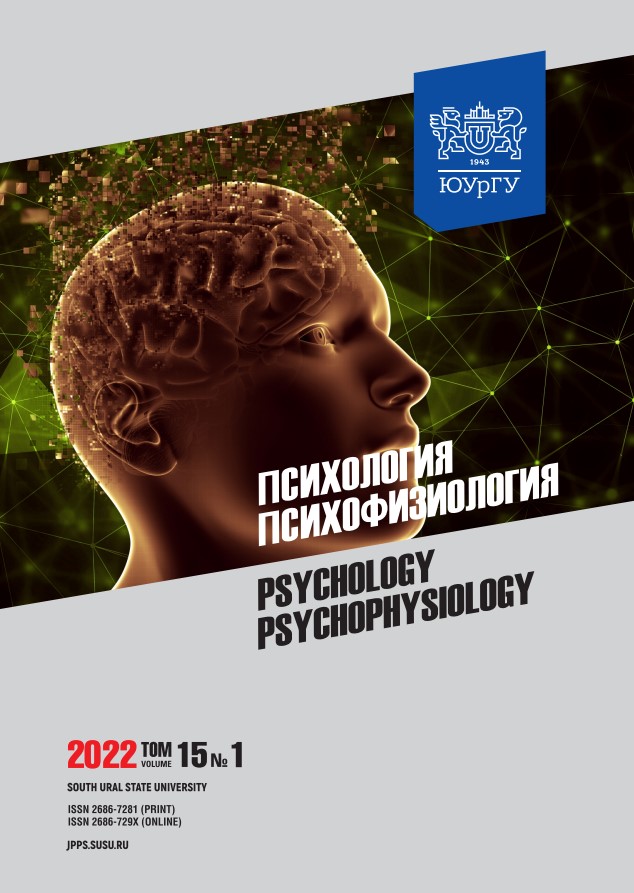Individual psychological characteristics and self-presentation of adolescents in educational settings
Abstract
Introduction. The article presents the results of an empirical study on the formal and dynamic characteristics of a student’s personality, its fundamental properties, intelligence, cognitive styles and self-presentation in educational settings. Self-presentation in educational settings is considered as a special form of activity, which combines individual psychological characteristics, cognitive features and styles with respect to the objectives and specifics of communication in order to demonstrate an appropriate image and impress others. Aim. The paper aims to identify the formal and dynamic characteristics of a student’s personality, its fundamental properties, intelligence, cognitive styles and self-presentation in educational settings. Materials and methods. The study involved 149 adolescents between 13–14 years of age (Lyceum No. 42, Ufa), including 64 boys and 85 girls. The study was performed using the following tools: V. Rusalov questionnaire on the formal and dynamic characteristics of a personality (temperament); Eyesenck personality questionnaire modified by V. Rusalov; E. Volkova and V. Rusalov CPS – Q questionnaire; R. Amthauer Intelligence structure test modified by L. Yasukova. The results obtained were processed with IВМ SPSS Statistics v. 27 (descriptive statistics, ANOVA). Results. It was found that self-presentation was determined by a dominant activity of a person (cognitive, communicative, psychomotor). The psychological profiles of adolescents were obtained based on their individual and psychological characteristics. These profiles reflect the specifics of self-presentation and students’ preferences with regard to educational activities (individual, group, practice/subject-oriented). Conclusion. The knowledge of self-presentation and its specifics will allow teachers to select educational technologies, which contribute to a comprehensive, accurate and meaningful understanding of a subject, and find the most effective way of providing educational services.
Downloads
References
2. Pontari B.A., Glenn E.J. Engaging in Less Protective Self-Presentation: The Effects of a Friends Presence on the Socially Anxious. Basic and Applied Social Psychology. 2012;34(6):516–526. DOI: https://doi.org/10.1080/ 01973533.2012.728112.
3. Schlenker B.R., Trudeau J.V. Impact of self–presentations on private self–beliefs: Effects of prior self-beliefs and misattribution. Journal of personality and social psychology. 1990;58(1):22–32. DOI: https://doi.org/10.1037/0022-3514.58.1.22.
4. Khoroshikh V.V. Self-presentation as resource of modern specialist. Nauchno-tekhnicheskiye vedomosti Sankt-Peterburgskogo gosudarstvennogo politekhnicheskogo universiteta. Gumanitarnyye i obshchestvennyye nauki = Scientific and technical sheets of St. Petersburg state polytechnical university. Humanities and social sciences. 2013;1:22–24. (in Russ.).
5. Shkuratova I.P. Samopred"yavlenie lichnosti v obshchenii: monografiya [Self-presentation of personality in communication: monograph]. Rostov-on-Don. Publ. house YuFU, 2009:192. (in Russ.).
6. Weigold M. F. Communication science: A review of the literature. Science Communication. 2001;23:164–193. DOI: https://doi.org/10.1177/10755 47001023002005.
7. Izotova E.I. Features of self-representation in teenagers with different levels of identity development. Psihologicheskie issledovaniya = Psychological research. 2012;5(26):9. (in Russ.).
8. Trifonova T.A. Features of the relationship between self-presentation and character traits. Portal psihologicheskih novostej = Psychological news portal. Available at: http://www.psypress.ru/articles/22648.shtml (accessed 04.11.2021). (in Russ).
9. Shkuratova I.P., Gotseva Yu.A. Self-presentation of adolescents in interpersonal communication. Prikladnaya psihologiya: dostizheniya i perspektivy = Applied Psychology: Achievements and Prospects. 2004;267–283. (in Russ.)
10. Zhuravleva I.A. Self-presentation as a form of individuals performance. Pedagogicheskoe obrazovanie i nauka = Pedagogical education and science. 2012;8:19–25. (in Russ.).
11. Rusalov V.M. Theoretical problems of constructing a special theory of human individuality. Psikhologicheskiy zhurnal = Psychological journal. 1986;7(4):23–35. (in Russ.).
12. Trofimova I.H. The relationship of the characteristics of temperament with some features of human cognitive activity. Voprosy psihologii. 1997;1:74–82. (in Russ.)
13. Trofimova I., Sulis W.H., Robbins T.W. et al. Taxonomies of psychological individual differences: biological perspectives on millennia-long challenges. Philosophical Transactions of the Royal Society B: Biological Sciences. 2018;373(1744):20170152. DOI: https://doi.org/10.1098/rstb.2017.0152.
14. Trofimova I. Observer Bias: An Interaction of Temperament Traits with Biases in the Semantic Perception of Lexical Material. PLoS ONE. 2014;9(1):e85677. DOI: https://doi.org/ 10.1371/journal.pone.0085677.
15. Uher J., Trofimova I., Sulis W. et al. Diversity in action: Lessons learned about taxonomies of individual differences and psychopathology. Philosophical Transactions of the Royal Society B: Biological Sciences. 2018;373(1744):20170172. DOI: https://doi.org/10.1098/rstb.2017.0172.
16. Volkova E.V. Developmental learning: theoretical and empirical considerations. Procedia – Social and Behavioral Sciences. 2013;82:81–86. DOI: https://doi.org/10.1016/j.sbspro.2013.06.228.
17. Davydov V.V., Slobodchikov V.I., Tsukerman G.A. Junior schoolchild as a subject of educational activity. Voprosy psikhologii = Questions of psychology. 1992;3-4:14–19. (in Russ.).
18. Volkova E.V. Tekhnologii razvitiya mentalnykh resursov [Technologies for the development of mental resources]. Moscow. Institute of Psychology RAS Publ. House. 2016:256. (in Russ.).
19. Rusalov V.M., Volkova E.V. Personal cognitive styles and their correlation with persons temperament and character in early youth. Psikhologicheskiy zhurnal = Psychological journal. 2015;36(5):32–42.
References on translit
-Copyright (c) 2022 Psychology. Psychophysiology

This work is licensed under a Creative Commons Attribution-NonCommercial-NoDerivatives 4.0 International License.



